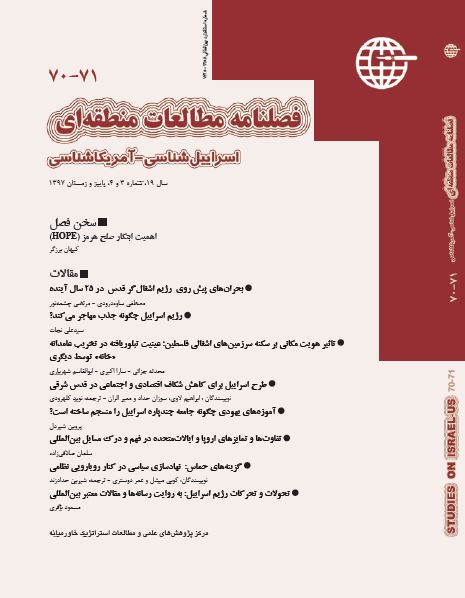فهرست مطالب
نشریه مطالعات منطقه ای
سال سوم شماره 8 (سال 1380)
- اسراییل شناسی - آمریکا شناسی
- بهای روی جلد: 9,500ريال
- تاریخ انتشار: 1380/06/25
- تعداد عناوین: 14
-
صفحه 0
- مقالات
-
صفحه 39
-
صفحه 125
- اسناد
- دیدگاه و گزارش
-
صفحه 213
-
امکانات انسانی و تکنولوژیک اسراییلصفحه 223
- نقد و بررسی
-
شوق دموکراسیصفحه 251
-
سیاست در احزاب آمریکاصفحه 265
-
طرح اسراییل بزرگ با توجه به عوامل جمعیتی، نفت و آبصفحه 280
-
Page 1Due to the fact that Israel grants serious attention on securing its interests in the Middle East, its military buildup and presence have increased over time, which deems it necessary to analyse the different aspects of its security threats in the area. The present article while stressing a direct relationship between Israeli interests and its actions in the region, emphasizes that the expansionism exercised is related to the survival of the Israeli state.The questions raised and answered in this article are: what are the new security threats of Israel? Can these threats destabilize the political balance of the region?In order to analyze the new threats, the military structure of Israel is evaluated in this article.
-
Page 39The rise of education in importance in the twentieth cenutry especially the due attention given to higher education in all countries deserves to be explored. The case of the United States in this regard is of higher importance mainly to the position it occupies on the world scene. The U.S. has a special position even among the seven industralized countries due to lengtivity and role it plays in the American society.The present article while reviewing the history of higher education in the U.S. deals with long-distance education and learning and then analyzes the policies governing institutions of higher learning in America. In order to get a better understanding of higher education in the United States, details especially of state and non-State universities, the role research plays in higher education and costs pertaining to it are the foci of this article.
-
Page 65The present article by referrring to last Septembers hostilities in Palestine poses this fundamental question: had arafat accepted the Israeli proposals at Camp Divid, the recent conflicts would have taken the shape of an internal war in Palestine?The article continues by reviewing the new foundations of Intifadeh and examines three factors: (1) The long discontent due to peace process and Oslo talks; (2) Camp David summit in July 2000; (3) The pre-planned threatening visit of Ariel Sharon the leader of Likud party of the holy sites in Jerusalem on 28th September 2000. the writer reviews the above factors and analyzes Arafats role in confrontation to them and legitimacy of the actions within Palestinian organizations.
-
Page 83What conditions lead the U.S. presidents to use economic sanctions? Both relations with the target country and domestic politics are considered as conditions leading to the employment and later removal of economic sanctions. Using time-series cross-sectional data, the analysis shows that the president considers both the relations with the target country and U.S. domestic factors when deciding to impose economic sanctions, although the relations with the target have a much greater impact on the decision. Once the economic sanctions are in place and the president must decide to maintain or alter them, the domestic political influence disappears, and the president considers only the relations with the target when modifying sanctions policy.
-
Page 125The issue of women has captured public opinion worldwide leading to seminars and conference held all over the world that have deait with the rights of women, their functions, duties and responsibilities together with their political Larticipation.The situation of women in Israel that has occupied the land of Palestinians and prouds itself to be the most democratic government in the Middle East, is of prime importance.The article deals with the state and conditions of women in Israel, by using Israeli sources. The translation is aimed at informing Persian-speaking people of one of the issues faced by the Israeli society.
-
Page 147The author argues that Machiavellis political theory provides us with a framework that can be used to illuminate the words and deeds of Abraham Lincoln. He draws primarily on the competing interpretations of Machiavelli offered by J.G.A. Pocock, on the one hand, and Harvey Mansfield on the other. According to the author, Pococks and Mansfields very different readings of Machiavelli can both be employed to shed light on Lincolns multifaceted statesmanship. This conclusion is at odds with the interpretation of Lincoln offered by John Patrick Diggins in The Lost Soul of American Politics. Accroding to Diggins, there may be some similarities between Lincoln and Machiavelli, but such similarities ... are far less telling than the contrasts. The author hopes to convince the reader that a Machiavellian interpretation of Lincoln is, in fact, far more compelling than Diggind would have us believe.


